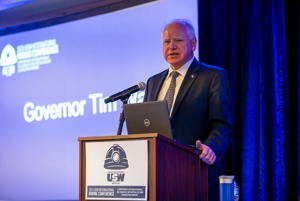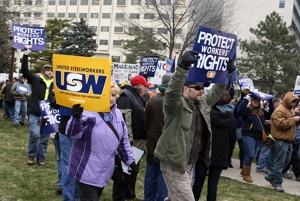Paying Attention to the Precariat
But last week, New York Times columnist David Brooks broke the pattern. In “The American Precariat,” Brooks tries to explain why Americans, who used to be willing to move in order to improve their economic position, are increasingly likely to stay put, even when that means passing up potential jobs. According to Brooks, some people are trapped by homes that are underwater and workers have little incentive to move, since labor markets are pretty much the same everywhere, a change from the past, when different regions offered distinct opportunities.
But Brooks also suggests that the major reason Americans are staying in place both geographically and economically is a “lack of self-confidence.” Few workers today are willing to risk “the temporary expense and hardship [of moving] because you have faith that over the long run you will slingshot forward.” Brooks also sees evidence that Americans lack self-confidence in declining fertility rates and in more people staying in the jobs they have rather than voluntarily leaving to look for something better. He also cites evidence from opinion polls showing that an all time low of only 46 percent of Americans report that they expect their economic condition to improve. “American exceptionalism,” he writes, “is basically gone.”
All of this leads Brooks to the idea of the precariat, “a concept that has been floating around Europe” for which he cites British scholar Guy Standing. Brooks sees Americans embracing an “uncharacteristic” fatalism, something we’d expect to see in Europe, but not here.
More conservative commentators and think tanks should pay attention to the American precariat. Clearly, the growing number of individuals who lack employment security, job security, income security, skill security, occupational security, and labor market security are threat to conservative benefactors. Among other things, the precariat is long past believing conservative promises, like trickle-down economics or the idea that having five jobs by the time they’re 35 gives young workers flexibility and opportunity.
But like Brooks, most conservatives would rather talk about how individuals lack self-confidence than address the real economic challenges facing many Americans today. Rather than offering substantive policies, some conservatives suggest that moving vouchers would help poor people pursue opportunities (an approach that would also reduce the kind of the concentration of insecure workers that led to Occupy Wall Street). Their analysis ignores how Wall Street and global corporations have changed work practices and benefit structures, stigmatized the unemployed, and championed the loss of public assistance. Moving vouchers and appeals to self-confidence won’t prevent the precariat’s growing resentment toward the 1% and their apparatchiks.
Like journalists, the academic community has been slow to join the discussion of precarity. A few institutions have hosted Guy Standing as a visiting scholar, and some scholars have organized panels on the topic at disciplinary conferences. But two upcoming conferences suggest growing interest among academics. At Georgetown University, the Lannan Symposium Living in a Precarious World will feature writers, scholars, workers, and activists discussing questions such as “How does the struggle to get by shape our lives, our relationships, and our social institutions? How do we challenge the rise of precarity, and what, if anything, does it offer as the basis for resistance?” Yale University will host a conference in April on the Conditions of Precarity: Life Work, and Culture, focused on how the humanities can provide “the space to describe current phenomena of precarity, situate what is new in the context of a long tradition of human experience and critically engage with this tradition.” Both events take an interdisciplinary approach, linking the humanities with political and economic analysis. The Georgetown conference also goes beyond academic talk about precarity. Its opening panel will include adjunct faculty, low-wage workers, and activists organizing in both the formal and informal economy.
Interdisciplinary analysis of precarity should be expanded beyond elite universities, but academics must do more than talk about precarity. They should also study and collaborate with community and labor groups like the Excluded Worker Movement that is organizing the precariat, including millions of farmworkers, domestic workers, tipped workers, guest workers, and day laborers. It collaborates with other organizations on campaigns to win immediate improvements in the conditions facing excluded workers; to strengthen and expand the labor movement; and to develop a new framework to transform and expand workers rights to organize in the 21st century. Journalists should be covering these efforts, and academics should be studying them and joining them.
In a world in which we are all increasingly expendable and insecure, we need to join forces. The precariat will not be fooled into blaming themselves for lacking self-confidence. If David Brooks does not believe this, he should notice the empty desks in his newsroom. Better yet, go talk with the many displaced reporters who cannot find work as journalists and have become part of the precariat.
***
This has been reposted from the Center for Working Class Studies.
***
By clicking Sign Up you're confirming that you agree with our Terms and Conditions.
Related Blogs
Ready to make a difference?
Are you and your coworkers ready to negotiate together for bigger paychecks, stronger benefits and better lives?

